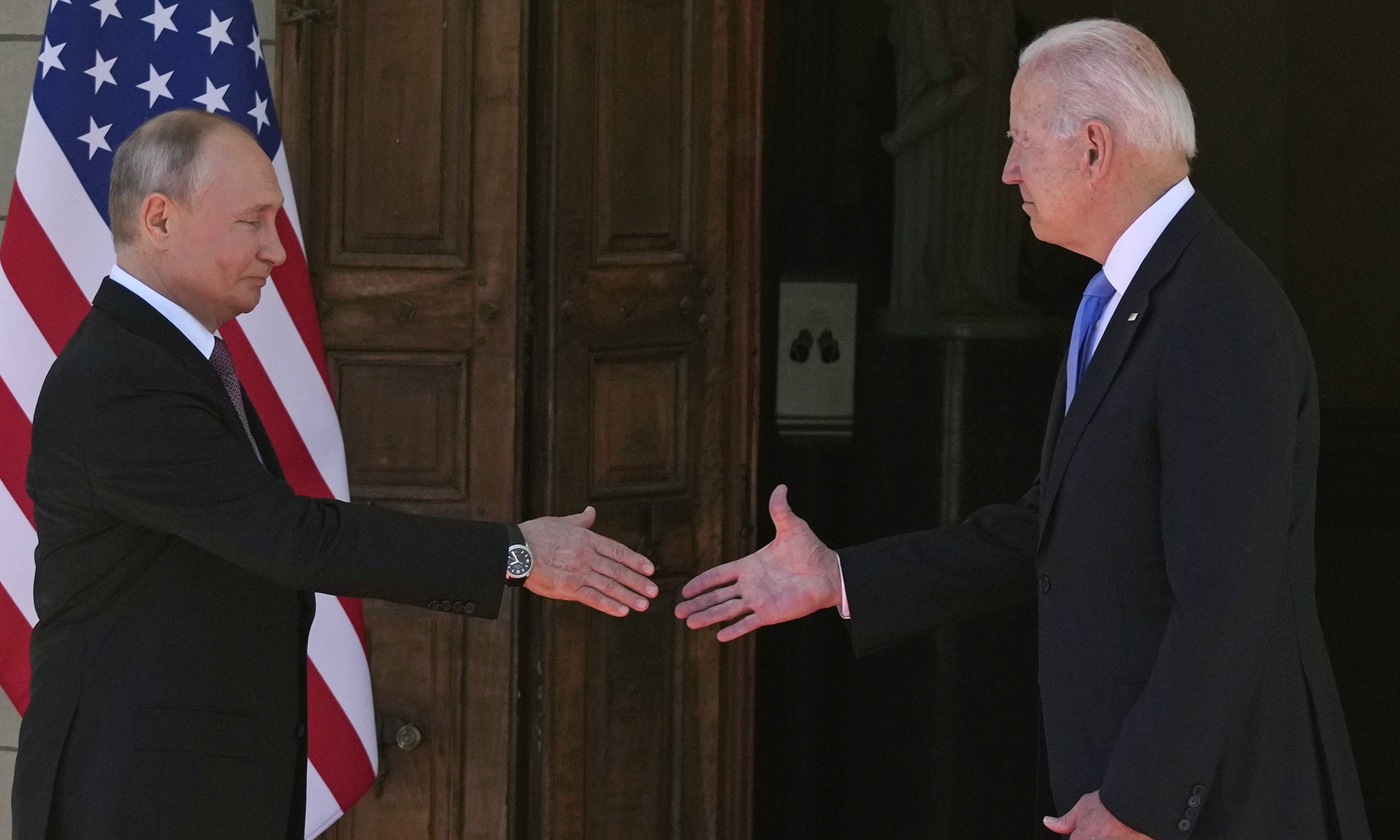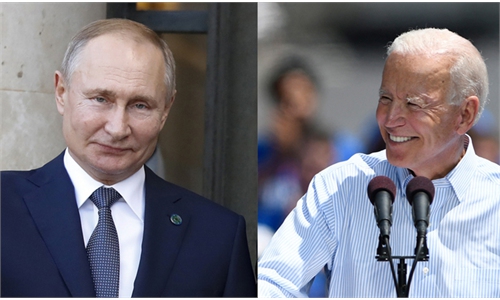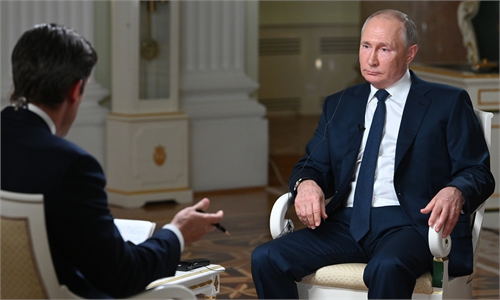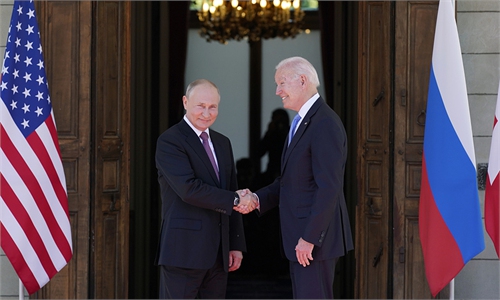Putin, Biden shake hands amid anticipation yet low expectation
Summit details suggest Russian side ‘more in control, more relaxed’

US President Joe Biden and Russian President Vladimir Putin arrive to meet at the Villa la Grange on Wednesday in Geneva, Switzerland. Photo: AP
Russian President Vladimir Putin and US President Joe Biden finally shook hands at an 18th-century Swiss villa perched above Lake Geneva on Wednesday, but as the two sides and most observers worldwide have downplayed expectations ahead of the summit, the meeting is unlikely to mark an end to tensions between the two global powers, with Chinese analysts saying that Biden needs the summit more than Putin.
After the handshakes outside the building, Biden moved inside and talked to media. Putin said to Biden that he thanks Biden for the initiative to meet and hopes their "meeting will be productive." Biden responded "As I said outside, I think it's always better to meet face to face."
Biden finally shook hands with Putin, whom he once said was a "killer" in an interview with media. When they met, the journalists neither saw the "intense talk" between the two leaders which occurred in the meeting between Obama and Putin, nor the "dramatic atmosphere" when former US president Donald Trump appeared to be dazzled by Putin.
The 78-year-old Biden and Putin, 69, exchanged decent and short opening remarks, but media outlets and observers worldwide consider this is probably the friendliest atmosphere that they can create.
The two leaders didn't hold a joint press conference nor sign any joint documents. Before the meeting, Putin released a lot more information than Biden did through media. This also proves that Putin is better at handling media than his US counterpart, as experts said Putin is a Russian leader that has the experience in dealing with five different US presidents, from Bill Clinton to Biden, and he perfectly understands what the US is.
After the long meeting, Putin held his own press conference. Describing the talks as constructive, Putin also criticized the US harshly for accusing Russia of cyber attacks and human rights issues while the US has a terrible record on it when he answered questions of media after the talks.
Claiming his agenda is "not against Russia," Biden said at his own press conference that the US will speak out against human rights violations and will not tolerate interference in US democracy.
Li Haidong, a professor at the Institute of International Relations of the China Foreign Affairs University, noted the extensive analysis of the diplomatic etiquette and the atmosphere at the villa porch is a reflection of how highly anticipated the summit is, particularly as both sides describe bilateral relations as being at the lowest point in decades.
The fundamental interests of Russia cannot be guaranteed by the US as the latter is still imposing sanctions on Russia in various aspects. This is an abnormal political atmosphere, which determines that the relationship between the two countries cannot be sound from a strategic point of view, said Yang Jin, an associate research fellow at the Institute of Russian, Eastern European and Central Asian Studies under the Chinese Academy of Social Sciences.
Technically, the two countries have many pressing issues to solve, such as regional security, NATO enlargement, nuclear missiles, Syria and Ukraine. The two sides cannot reach a consensus on the bottom line, Yang believes.
Lü Xiang, a research fellow in US studies at the Chinese Academy of Social Sciences in Beijing, told the Global Times that the meeting with Putin is the most important goal for Biden's trip to Europe, as his prior meetings at the G7 or with NATO allies are more about showing unity. The meeting with Putin is about the real tensions, Lü said.
"Biden also hopes the summit could bring him some credit in the field of diplomacy," he added.
China is expected to be high on the agenda. Now that Biden has finally met almost all the leaders of major world powers, except for Chinese President Xi Jinping, and now he can probably prepare for the last and the most significant one as Biden is learning what the positions of all his major counterparts are on China, said some observers.
But in the coming months, there is no occasion or necessity for a China-US summit, and at the very least, China does not think the summit is urgent as it has a lot more important issues to deal with, Lü said.
Who's nervous?
All eyes are fixed on the summit, with international media outlets and netizens paying attention to the smallest detail they saw on the live broadcast. Putin arrived at the venue earlier than Biden.
Russian state news agency RIA has an interesting take on the protocol inside the villa. As Putin arrived at Villa La Grange before his counterpart, Putin sat on the right during the talks, RIA says. "In protocol language, this means the host of the summit is Russia." But some US and Western media outlets also said Biden was worried that waiting for Putin would be "losing face."
During the small talk between the two leaders, US Secretary of State Antony Blinken had a notebook and wrote something while Russian Foreign Minister Sergey Lavrov's hands were empty. Journalists at the venue were tightly packed and scuffles broke out as they jockeyed for position to photograph the two leaders, the noise almost drowning out comments Biden made.
"Did Blinken really need to take notes or write down some reminders to his boss?" said a Beijing-based expert on diplomacy who asked for anonymity, adding that it "Looks like Biden's nervousness is reflected in his cabinet representatives," since Putin and Lavrov seem much more relaxed.
Another interesting detail is that Biden called the US and Russia "two great powers" during the pre-summit small talk with Putin, but during the term of former US president Barack Obama, the US downplayed Russia's influence as a "regional power." Some observers said this shows that Biden wants to show Putin more respect.
"When we had exchanges with American scholars and officials in the past, they even tried to persuade us [Chinese scholars] that Russia is irrelevant as they believed Russia's strength is declining," Lü said, adding that this proves the arrogance of the US and that they have never respected Russia as an equal partner.
Now that Biden needs to ease the tensions and try his best to split China-Russia ties, he needs to show more respect to Putin, but the Russian President is a wise and strategic thinker, he noted.
This kind of respect could also bring trouble for Biden, because the US media, which is extremely hostile to Russia and Putin, will criticize Biden for appearing too weak and soft, said experts.
Be pragmatic
Although the two countries downplayed expectations ahead of the meeting, Yang believes they wanted to meet because the two major powers have consensus on certain areas of cooperation, and they need to prevent their worst bilateral relations from turning into a complete collapse at a time when the COVID-19 pandemic has taken a huge hit on world economy and political stability.
Economic recovery is a key mission for Biden, and there is nothing significant he can get from Russia, so his economic, financial and trade officials are keeping in touch with China, experts said.
The US would like to rope in Russia to contain China just as the world is being drawn into the most complicated diplomatic situation since the Cold War. However, Russia will not be easily fooled as China and Russia have close cooperation in a wide range of fields including trade, space and technology, Yang said. He noted that the US realizes that seeking conflicts cannot address its concerns and coordination with China is needed.
As the summit was proposed by the US, it seems the White House was in more urgent need of the meeting, though the Kremlin also wanted a dialogue to address the areas of most concern, Li told the Global Times on Wednesday. The leaders' meeting is expected to at least halt the declining trend in diplomatic relations, Li said.
Potential armed frictions in the Crimea, the Black Sea and the Baltic Sea would force the US to shift its strategic focus from the Indo-Pacific back to Europe, which Biden would go to great lengths to avoid, Li said.
There are always expectations that a Russia-US leaders' summit would repair bilateral relations to some extent, but 30 years of history proves that the method does not work out well - a meeting may soften standoffs for a while, but leaders' communications cannot change the structural conflicts in the interests of the two countries, Li noted.





